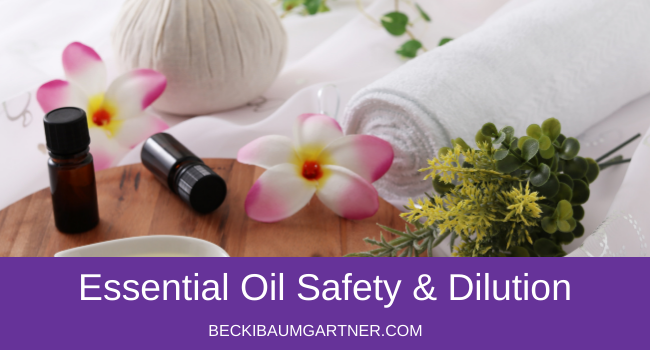Essential Oil Safety
Essential oils safety is one of the most important parts of an essential oil journey into natural health!
By now, you are probably aware of how powerful and potent essential oils are.
Now’s the time to take just a few minutes and prevent any accidents before they happen!
Places to Avoid Using Essential Oils
Never use essential oils in your:
- eyes
- ear canal
- mucous membranes
Dilution
Dilute, dilute, dilute!
Believe it or not, diluting not only makes essential oils safer, but it makes them work better! And, diluting saves you money in the long run.
Dilute by mixing your essential oil with a carrier oil. Then, apply to your skin.
The carrier oil “carries” essential oils onto your skin.
Some good examples of carrier oils are:
- coconut oil
- almond oil
- olive oil
- sesame oil
- grapeseed oil
- jojoba oil
The fatty carrier oils slow absorption and allow even application.
Diluting Essential Oils is Safe and Efficient!
Pure essential oils are very concentrated powerful! That’s why we need to dilute.
I recommend starting with a small amount to find what works best for you and your family.
Below are the recommended dilution starting points.
Dilution Starting Points
- Children – 1 drop per 2 teaspoons of carrier oil
- Adults – 1-4 drops per teaspoon of carrier oil
- Pregnancy – 1 drop per 2 teaspoons of carrier oil
- Seniors – 1 drop per 2 teaspoons of carrier oil
Experiencing Discomfort When Using Essential Oils?
If an essential feels uncomfortable when you apply it, immediately apply more carrier oil.
Using more carrier oil will dilute the essential oil, spreading it thinner and across more area of your skin.
Do not apply water or try to wash it off. Water drives essential oils in deeper, which causes more discomfort.
Hot Oils
Hot oils may not feel hot to the touch but may cause discomfort or blistering.
Therefore, you should always heavily dilute hot oils.
An example of heavy dilution is 1 drop per 2 teaspoons of carrier oil.
In addition, avoid using hot oils on broken or tender skin.
Hot oils include:
- cassia
- cinnamon
- clove
- oregano
- thyme
Always heavily dilute and use small amounts of hot oils!
Some other oils that may feel uncomfortable on sensitive skin are:
- citrus oils
- fennel
- ginger
- lemongrass
- peppermint
- wintergreen
doTERRA Oils You Cannot Ingest
Some oils are simply not safe for ingestion.
One of the things I love about doTERRA is they make it easy to tell if an oil is safe for ingestion or not. Simply look at the back of the bottle.
If there is a nutrient fact label (like you see on any food at the grocery store), then the oil is safe for internal use.
If the nutrient fact label is missing, the oil is not safe for internal use.
Never ingest:
- arborvitae
- cedarwood
- cypress
- eucalyptus
- white fir
- wintergreen
Essential Oil Accidents
If an oil becomes uncomfortable, apply carrier oil–not water.
If you accidentally get oil in your eyes, flush your eyes with milk or some other fatty liquid.
In case of accidental ingestion of non-edible essential oils or of too much of any oil, contact Poison Control at 1-800-222-1222 for advice.
Basic Essential Oil Tips
Start with small amounts at first. Usually, 1-2 drops is enough for an adult.
For elderly, children, or sensitive people, perform a sensitivity test before fully using an oil. To test for sensitivity, use standard dilution and apply a small amount on your inside wrist creases. Keep an eye on the area for 4-6 hours. If you have no reaction, the oil should be safe to use on a regular basis.
Don’t use plastic bottles for storing or drinking essential oils.
Keep essential oils away from heat sources–they can be flammable!
Keep essential oils out of children’s reach. Use a small amount of any new oil and observe your child’s reaction carefully.
Citrus oils may increase sun sensitivity. Allow at least 12 hours between oil application and sun exposure.
Remember, oils and water don’t mix completely. Keep this in mind when using oils in hour bath or adding oils to your drink.
Heavy use of essential oils could potentially interact with certain medications.
Internal use of essential oils should only happen after you’ve personally researched or have the guidance of an experienced practitioner. If you’re pregnant or breastfeeding, on medications, or have liver or immune challenges you should talk to your health care practitioner.
Repeated use of and undiluted essential oil in the same place on your body can lead to sensitization.
Be careful using essential oils around cats. They metabolize oils differently. If you have a cat and like to diffuse, keep the door open so the cat can leave at will.
I hope this information helps you! If you have any questions or if I can help you in any way, just let me know!
